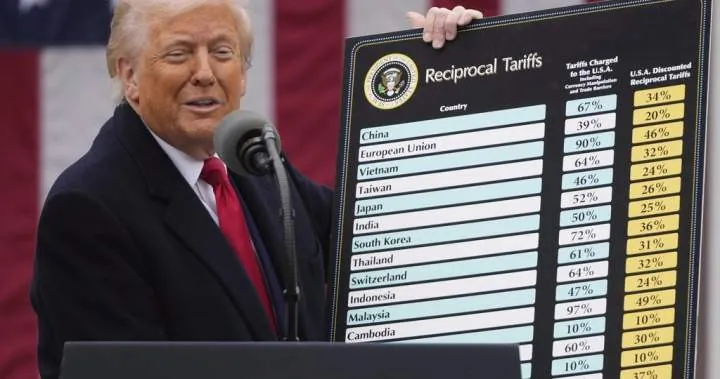
Trump's Bold Move: Will the Supreme Court Back His Controversial Tariffs?
2025-09-03
Author: Michael
In a dramatic turn of events, U.S. President Donald Trump is set to challenge lower court rulings and seek validation from the conservative-dominated Supreme Court for his controversial emergency tariffs. This comes after a federal appeals court recently ruled 7-4 against him, deeming the tariffs illegal.
On Tuesday, Trump announced that he would file an expedited request with the Supreme Court, emphasizing the urgency for a swift decision to avoid what he warned could be economic "devastation." The tariffs in question were imposed under the International Emergency Economic Powers Act (IEEPA), which critics argue does not provide the president with unlimited authority to levy such taxes.
The recent ruling from the U.S. Court of Appeals for the Federal Circuit has put Trump in a tight spot, as it upheld a lower court's conclusion that the IEEPA does not explicitly mention tariffs among the powers it grants the president during a national emergency. This setback is significant, given Trump’s previous string of victories in the Supreme Court concerning immigration and military policies.
Will the Supreme Court Favor Trump This Time?
Experts are split on whether Trump's appeal will succeed. The conservative 6-3 majority in the Supreme Court might enhance his chances, yet legal analysts caution that the court's decision will hinge on broader constitutional interpretations. John Veroneau, a prominent trade lawyer, expressed skepticism, suggesting that it’s hard to believe the Supreme Court will interpret IEEPA in a way that allows the president to unilaterally alter tariff codes without clear legislative backing.
This ongoing legal battle also touches on the so-called "major questions doctrine." This legal principle requires Congress to explicitly grant executive agencies significant powers, such as those that could drastically impact the economy. A recent ruling against President Joe Biden’s student loan forgiveness plan indicates that the Supreme Court may insist on clear congressional intent regarding significant economic policies.
Implications of a Supreme Court Ruling
If the Supreme Court sides with Trump, it could redefine presidential powers concerning trade policy and tariffs. Conversely, a ruling against him may lead to complex refund challenges for businesses that paid duties under these tariffs, potentially resulting in widespread litigation.
Interestingly, the Trump administration is already exploring alternative pathways for imposing tariffs, citing national security under the Trade Expansion Act. This includes new investigations into imports like furniture, illustrating the administration's determination to maintain a tough trade stance.
As the legal drama unfolds, officials, including Treasury Secretary Scott Bessent, remain optimistic about the Supreme Court’s potential support for IEEPA-related tariffs. However, the uncertainty looms large as Trump prepares to pivot strategies based on the ultimate outcome of this high-stakes case. Record collections from the IEEPA tariffs currently stand at $65.8 billion, demonstrating their economic weight.
With a final decision anticipated in early 2026, the stakes couldn't be higher for Trump's legacy and the future direction of U.S. trade policy.









 Brasil (PT)
Brasil (PT)
 Canada (EN)
Canada (EN)
 Chile (ES)
Chile (ES)
 Česko (CS)
Česko (CS)
 대한민국 (KO)
대한민국 (KO)
 España (ES)
España (ES)
 France (FR)
France (FR)
 Hong Kong (EN)
Hong Kong (EN)
 Italia (IT)
Italia (IT)
 日本 (JA)
日本 (JA)
 Magyarország (HU)
Magyarország (HU)
 Norge (NO)
Norge (NO)
 Polska (PL)
Polska (PL)
 Schweiz (DE)
Schweiz (DE)
 Singapore (EN)
Singapore (EN)
 Sverige (SV)
Sverige (SV)
 Suomi (FI)
Suomi (FI)
 Türkiye (TR)
Türkiye (TR)
 الإمارات العربية المتحدة (AR)
الإمارات العربية المتحدة (AR)